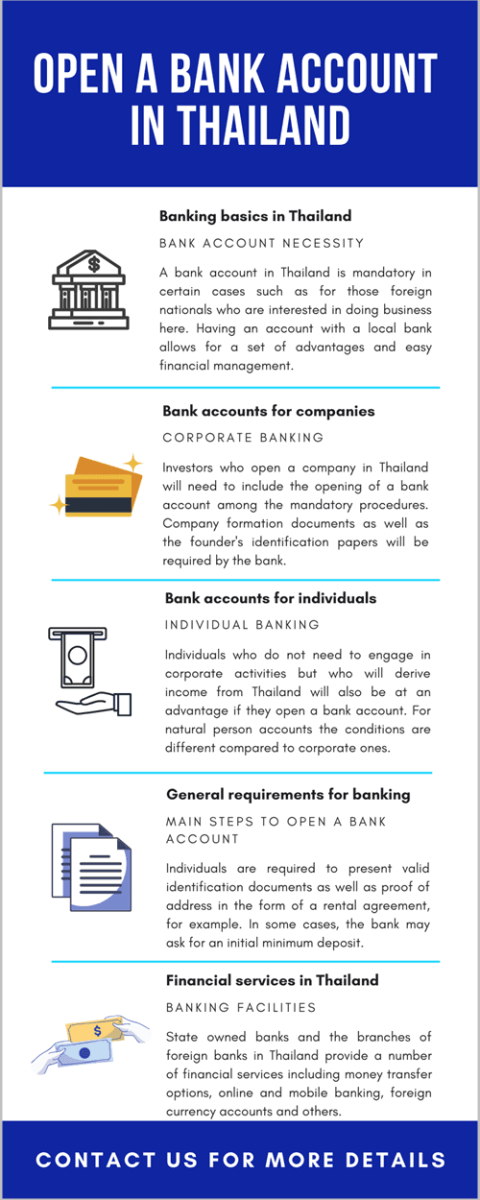For persons that are non-residents of Thailand, setting up a bank account in this country is an option that heavily depends on an important condition, namely the possession of a work permit/visa here. Persons that possess one can open a bank account in Thailand at one of the following banks: Bangkok, Thai Bank, Kasikorn, Siam Commercial, Kiatnakin, Krung Thai or Siam City Bank.
Our Thai company formation consultants can provide foreign investors interested in starting a business in Thailand in 2024 with more details about the requirements for opening a corporate bank account.
Table of Contents
What documents are necessary for opening a bank account in Thailand?
Those that do not possess a work permit, mostly expats that have a non-immigrant type of visa or a tourist visa can apply at: TMB, Bangkok or UOB Bank. They will need to present:
• their valid passport;
• the second form for identification in order to open a bank account in Thailand is a type of ID that contains a photo – generally a driver’s license – or a reference letter received from the embassy or from a bank situated in their native country. If their spouse is of Thai origin, they can present the marriage certificate or the ID of the husband or wife.
• a document that certifies the ownership of a house, a lease agreement or a utility bill.
Our specialists in company registration in Thailand can help foreign and local businessmen set up a corporate bank account.
| Quick Facts | |
|---|---|
| Mandatory local bank account for companies (Yes/No) | Yes |
|
Mandatory residence requirement |
Yes |
|
Bank account opening time in Thailand |
Approximately 1 hour when visiting the bank branch (provided that all the documents are in order). |
| Online bank account opening | e-Savings accounts can be opened with some banks. |
| Bank accounts for foreign nationals |
Foreign nationals are permitted to open a bank account in Thailand as long as they have a long-term visa. |
| Required documents – companies |
The Board’s decision to authorize the opening of the account, the company’s constitutive documents, information about its shareholders and directors, etc. |
| Required documents – individuals |
ID card and other documents, as needed. |
| Special requirements for foreign nationals who open a bank account in Thailand |
Foreigners can be subject to specific conditions, as determined by the bank. |
| Bank fees |
Examples include a 5,000 THB (not including VAT) for bank account opening. Banks set their own service fees. |
| Initial deposit | Banks may require a minimum deposit of 500 Baht for some types of accounts. The amount differs according to the chosen bank. |
| Types of bank accounts in Thailand |
Savings account, basic banking account, current account, operating accounts for businesses, etc. |
| Online banking |
Yes. Features depend on the chosen bank. |
| Local agent requirements |
Not mandatory. |
| Main banks |
Bangkok Bank, Kasikorn Bank, Siam Commercial Bank, KrungThai Bank. |
| Criteria for choosing the bank | Branch availability and locations, ATM availability, mobile banking and mobile app features, etc. |
Who can open a bank account in Thailand?
Immigrants who hold a non-immigrant Thai visa, a residence, and a work permit in Thailand can open a bank account, in order to receive the remuneration and to make financial transactions. People with Thai business visas can open a bank account in Thailand when registering a company in the country.
A corporate bank account for a Thai company is subject to certain requirements and it is important that investors take note of these before choosing the bank and starting the account opening process. This is relevant because investors will need to prepare a number of documents required by the bank and failure to do so results in the inability to open the account or, at least postpone the operation, which will in turn lead to the impossibility to commence the business activities.
When they open a bank account in Thailand in 2024 for a corporation, company owners or representatives need to provide proof of company registration, the identity documents of the authorized persons, the certificate of shareholder registration, the Minutes of the Board Meeting that authorizes the opening of the account and information about the authorized representative, the one who will be able to withdraw funds and perform other operations.
Make sure to solicit details about the benefits that come with this type of bank account and about the online platform available for clients who want to make all the money transfers via the internet.
Our team of agents offers complete services for company formation and related matters. For many foreign nationals, the language barrier is an issue and our team can assist during the process of opening a bank account, whether it is through assistance in filling in and preparing the documents or accompanying the individual to the bank/acting as an authorized representative who can open a bank account in Thailand in someone else’s name. For details on the final option, please reach out to us.
Entrepreneurs who rely on our assistance when they open a bank account can also request personalized services from our Thai accountants. We offer bookkeeping services, along with solutions for preparing and submitting the annual financial statements required for all companies. Moreover, we also offer services for the audit of the company’s annual financial statements.
What are the non-resident bank accounts in Thailand?
Organizations from overseas with permanent establishments in Thailand, visitors from abroad, temporary workers, the representative offices in Thailand enter the category of non-residents. There are particular requirements to consider if you want to open a bank account in Thailand like offering details about the temporary job you have in Thailand. The employer can help you with an official letter in this matter.
The documents required when opening a Thai bank account for an overseas company are similar and include the Minutes of the Board Meeting that authorized the opening of the account (as well as the designated individuals who will be appointed for this purpose and will handle the opening and the closure of the account, as needed). Additionally, the applicant will submit the foreign company’s certificate of incorporation, the articles of association and memorandum as well as the identification documents (the passports) of the directors and the authorized representatives. A power of attorney is needed when the individuals signing the bank account opening documents is not the company director.
All of the company documents submitted for opening a corporate bank account in Thailand for an overseas company are verified by the Thai Embassy or Consulate in the country in which the respective legal entity is registered. For proof of company registration, the expiry date of the document should not be too close to the date on which the application is made. Other conditions for foreign-issued documents apply, including the fact that certain documents may need to be translated by a sworn translator and then notarized.
Because one of the main conditions when opening a bank account in Thailand is to be physically present when making the submission, the assistance offered by our lawyers can be important for foreign nationals who cannot be present in the country at all times. In some situations, our specialists can act on the client’s behalf based on a power of attorney that will grant specific rights related to handling banking matters.
Perks of opening a bank account presented by our company registration consultants in Thailand
Opening a bank account in Thailand provides you with the following advantages:
• ATM Withdrawal fees are usually between 150 and 180 baht.
• A usual 3% conversion rate for ATM withdrawals or currency exchange.
• Possibility to transfer funds anywhere in the world.
• Possession of a debit card that enables numerous in-store and online purchases.
Please note that banks can update their conversion rates and withdrawal fees in 2024. Existing clients are duly notified of these changes, however, if these rates are a condition upon which you are likely to work with one bank or not, we advise you to seek updated information, including from our team of company formation agents.
Also, a 500 baht has to be paid for the issuing of the debit card in some cases, but the operation is very rapid (as stated above, different banks can have different debit card issuing fees). Credit cards are approved for persons who have been living in Thailand for a long time. Before everything is completed with the setting up of the account, you must also set up a withdrawal limit.
As in many other countries, there are several bank account types available in Thailand. We briefly list these below:
- Current account: for deposits, withdrawals, and other types of transactions; this is commonly asked for by those who open a bank account in Thailand;
- Savings account: some employees or business people in the country may also need a separate savings account; this is an interest-bearing account and it can be subject to conditions, depending on the chosen bank;
- Fixed-term account: used for locking the funds for a pre-determined period; it can be an alternative to the savings account;
- Foreign currency account: similar to a current account, only that it is in other currencies that can be held by individuals in Thailand (EUR, USD, etc.); suitable for foreign investors in the country.
The terms and conditions for these types of bank accounts differ according to the chosen bank. You can reach out to our team of specialists before you choose the bank with which you will work if you need more details or if you require specialized assistance during this process.
When choosing to open a bank account in Thailand, entrepreneurs as well as individuals will look for a package of solutions that will meet their needs. These may be related to flexibility or accessibility, for easy usage (including good mobile banking solutions). International investors in Thailand, as well as foreign employees, will naturally look for an account that will meet their international needs. We can help you with more information about the foreign currency accounts as well as other solutions, especially for those who are looking for more complex financial solutions.
Provisions of the Commercial Banking Act in Thailand
The commercial banks, the financial entities, the foreign exchanges and the undertakings of the commercial banking businesses in Thailand are governed by the Bank of Thailand, where an independent status is guaranteed, supporting the work line with the Minister of Finances’ policies. Granting credits, buying and selling foreign exchange, accepting money deposits from local or foreign citizens, and creating bank accounts are the main services a bank in Thailand offers. It is good to know that the Ministry of Finance deals with the necessary licenses for branches of banks with foreign capital, considering the rules and regulations stipulated in the Commercial Banking Act in Thailand.
It is good to know that a bank can be established as a public limited company, respecting the rules in this matter, where the minimum share capital needs to be in proportion to the registered liabilities and assets of the financial institution. Individuals who want to know more details about the Commercial Banking Law can solicit help and legal assistance from our company formation agents in Thailand.
The financial services offered by a bank in Thailand
People or companies in Thailand can benefit from varied financial services offered by all banks in Thailand, such as:
• national and international payment services;
• foreign currency exchanges;
• local or abroad money transfers;
• the opening of financial deposits.
Some of the advantages that clients may choose to look for include:
- the lack of a minimum mandatory balance;
- the ability to perform same-day internal transfers;
- the benefits associated with not having to convert funds (for foreign currency accounts);
- cost savings and the time needed to settle liquid funds.
The types of financial institutions that are recognized in the country can be divided into depository corporations and non-depository corporations. The first category includes commercial banks, specialized financial institutions, saving cooperatives and credit unions and money market mutual funds. Non-depository corporations include mutual funds, insurance and leasing companies, credit card and personal loan companies, provident funds, government pension funds, asset management companies, securities companies, agricultural companies and pawn shops.
When choosing a suitable bank to work with, another important criterion can be accessibility. This is why some will prefer to open a bank account in Thailand with a bank that has many branches in all areas of the country. The Bank of Thailand also provides information on the number of bank branches that are in place for the top banks in the country. The data is divided according to four different regions: the capital Bangkok, the Central, the Northeast, the North and the South. The information is useful if investors are interested in starting a business in an area that has fewer branches compared to the capital region. Our team of Thai company formation specialists highlights this below:
- Bangkok Bank: 229 branches in Bangkok, 274 in the Central region, 134 in the Northeast of the country, 140 and 118 in the North and South regions; a total of 895 branches;
- Krung Thai Bank: has a total of 854 branches, distributed in the following manner: 215 in Bangkok, 254 in the Central region, 134 in Northeast, 133 in the North and 118 in the South;
- Kasikornbank: 747 total branches – 264 in Bangkok, 246 in the Central region, 79 in the Northeast, 85 and 73 in the North and the South, respectively;
- Siam Commercial Bank: – this is the bank with the highest number of branches, a total of 959 throughout the country, distributed as follows: 321 in Bangkok, 324 in the Central Region, 99 in both the Northeast and the North, and 116 in the South.
The updated data for the beginning of 2023 on the existing number of bank branches for each of the important banks in the country was the following:
- Bangkok Bank: 245 branches in Bangkok, 287 branches in the Central Region, 121 in the Northeast Region, 127 in the North Region, and 108 in the South Region, with a total of 888 branches in the country;
- Krung Thai Bank: with a total of 939 branches, this is the bank with the highest number of branches throughout the country, according to the data made available by the Bank of Thailand at the time this article was written; most of the branches were located in the Central Region (272 branches);
The data summarized above was for March 2023. Our team can give you updated information as needed.
Other financial institutions with which investors may choose to open a bank account in Thailand include Bank of Ayudhya, TMB Bank or Thanachart Bank. Please keep in mind that the information presented herein was valid at the time this article was written and as per the data provided nu the Bank of Thailand according to recent statistics. In practice, the number of branches can change as some may close or relocate. You can reach out to our agents for updated information or for specific details about a certain region in the country that is of interest to company incorporation purposes.
According to more recent data from the Bank of Thailand, the country’s economic and financial/banking situation can be summarized by the following:
- According to data from the end of December 2023, the foreign exchange reserves were $646 billion in millions of US Dollars;
- The biggest Thai bank according to total assets was Bangkok Bank;
- The policy interest rate remained unchanged in February 2024, at 1.25%;
- The Thai economy is expected to grow in 2024 by 2.5 to 3% on a year-on-year basis; The main promoters of growth are thought to be private consumption and tourism;
- Moreover, according to a recent report from the Bank of Thailand, the overall financial system will remain resilient.
Thailand company registration considerations
As previously noted, when opening a corporate bank account, the financial institution will ask for the legal entity’s certificate of incorporation. This means that, before opening the bank account, the company owners will have followed the steps for company registration in Thailand.
This includes a number of pre-registration steps that interested investors should be aware of and one of the most important is name registration. The company name, in order to allow the new legal entity to be registered, needs to be a unique one and a pre-registration check can be performed.
The Thai company is registered with the Department of Business Development and the registration of a new company needs to take place within 30 days from the start of the business. Failure to register is subject to a penalty, in addition to the fact that lack thereof makes it impossible to open a bank account in Thailand. Company registration is subject to a fee, which should be taken into consideration as one of the main business start-up costs, along with those for opening a bank account.
Opening a bank account in Thailand in 2023 will also provide you with additional advantages, such as phone and internet banking. We invite you to contact our company registration agents in Thailand in case you need to set up a bank account for your business in this country.



